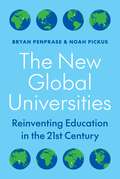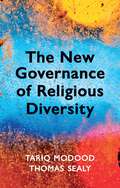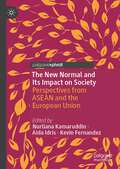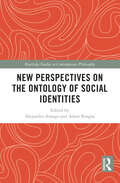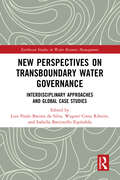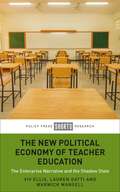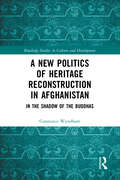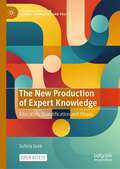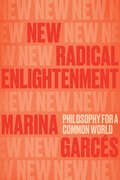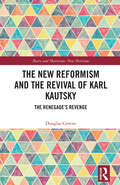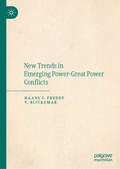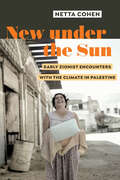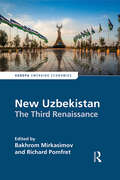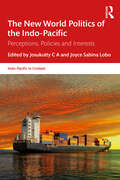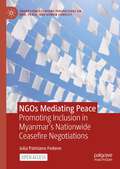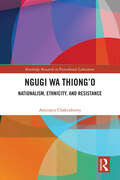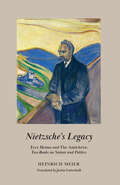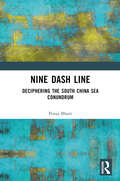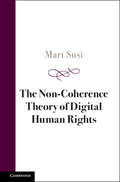- Table View
- List View
The New Global Universities: Reinventing Education in the 21st Century
by Bryan Penprase Noah PickusReimagining higher education around the world: lessons from the creation of eight new colleges and universities in Africa, Asia, the Middle East, and North AmericaHigher education is perpetually in crisis, buffeted by increasing costs and a perceived lack of return on investment, campus culture that is criticized for stifling debate on controversial topics, and a growing sense that the liberal arts are outmoded and irrelevant. Some observers even put higher education on the brink of death. The New Global Universities offers a counterargument, telling the story of educational leaders who have chosen not to give up on higher education but to reimagine it. The book chronicles the development and launch of eight innovative colleges and universities in Africa, Asia, the Middle East, and North America, describing the combination of intellectual courage, entrepreneurial audacity, and adaptive leadership needed to invent educational institutions today.The authors, both academic leaders who have been involved in launching ventures similar to the ones described, offer a unique inside perspective on these efforts. Bryan Penprase and Noah Pickus show how the founders of new colleges and universities establish distinctive brands in a sector dominated by centuries-old institutions, secure creative sources of funding, attract stellar faculty and students, and design appealing curriculums and campuses—all while managing tradeoffs and setbacks, balancing local needs and global aspirations, and wrestling with challenges to academic freedom. These new educational institutions include two universities in Asia and the Middle East built by well-established American parent institutions, others in Africa and North America that offer holistic reform from the ground up and leverage new technologies to lower costs, and still others that adapted the American liberal arts model to Asian and African contexts. Their experiences offer lessons for future founders of new universities—and for those who want to renew and rejuvenate existing ones.
The New Governance of Religious Diversity
by Tariq Modood Thomas SealyReligious diversity is a key feature of countries across the world today, but it also presents governments with very real challenges. Controversies around religious free speech, symbols, social values and morals, and the role of faith leaders as critical voices, are just a few of the issues that have given rise to fierce social, political and scholarly debate. So how do states include and accommodate religious diversity and should this change? What are the key difficulties facing states when it comes to governing religious diversity? Understanding this complex phenomenon means thinking through secularism, liberalism, multiculturalism and nationalism in theory and practice. In this new book, Tariq Modood and Thomas Sealy draw on original research to present new ways of analysing the governance of religious diversity in different regions of the world. Identifying the key challenges at stake, they also argue for a new statement of multiculturalism in relation to the governance of religious diversity, that of ‘multiculturalised secularism’, which represents a constructive and productive response to the reality of religiously plural societies.
The New Normal and Its Impact on Society: Perspectives from ASEAN and the European Union
by Nurliana Kamaruddin Aida Idris Kevin FernandezThis book focuses on the socio-cultural changes and issues experienced in ASEAN and the European Union in the post-pandemic world. In doing so, chapters discuss the social impact of specific themes such as changing work ethics, migration, and cyber security, which have shifted the cultural and economic landscapes of Southeast Asia and Europe. The book will be useful for policymakers, journalists, students, and those interested in discussions of regionalism, and the effects of Covid-19 on social policies ranging from the individual, domestic laws, to national and supranational policies.
New Perspectives on the Ontology of Social Identities (Routledge Studies in Contemporary Philosophy)
by Alejandro Arango and Adam BurgosThis volume presents new research in social ontology by focusing on questions related to the characteristics, categories, and conceptual methodologies surrounding social identities, in general, and specific social identities, in particular.The volume contains eight original essays, plus a foreword written by Linda Martín Alcoff, that engage with issues pertaining to a broad range of identities, including class, sexuality, gender, race, ethnicity, and religious identity. This collection is an abrebocas, an entry way to theorizing about social identities in novel ways, and the essays collected here point to specific modes of understanding and experiencing social identities that have not been given their due or that offer new approaches to well-worn topics.New Perspectives on the Ontology of Social Identities will appeal to scholars and advanced students across several philosophical disciplines, such as philosophy of race, feminist philosophy, social and political philosophy, phenomenology, epistemology, and social ontology. Scholars in disciplines like psychology, religious studies, and other social sciences will also find new approaches to questions of social identity relevant to understanding the complexity of the social world.
New Perspectives on Transboundary Water Governance: Interdisciplinary Approaches and Global Case Studies (Earthscan Studies in Water Resource Management)
by da Silva, Luis Paulo Batista Wagner Costa Ribeiro Isabela Battistello EspíndolaThis book presents a novel examination of transboundary water governance, drawing on global case studies and applying new theoretical approaches. Excessive consumption and degradation of natural resources can either heighten the risks of conflicts or encourage cooperation within and among countries, and this is particularly pertinent to the governance of water. This book fills a lacuna by providing an interdisciplinary examination of transboundary water governance, presenting a range of novel and emerging theoretical approaches. Acknowledging that issues vary across different regions, the book provides a global view from South and Central America, Africa, Asia, and the Middle East, with the case studies offering civil society and public managers concrete situations that indicate difficulties and successes in water sharing between bordering countries. The volume highlights the links between natural resources, political geography, international politics, and development, with chapters delving into the role of paradiplomacy, the challenges of climate change adaptation, and the interconnections between aquifers and international development. With rising demand for water in the face of climate change, this book aims to stimulate further theoretical, conceptual, and methodological debate in the field of transboundary water governance to ensure peaceful and fair access to shared water resources. This book will be of interest to students and scholars of water resource governance from a wide variety of disciplines, including geography, international relations, global development, and law. It will also be of interest to professionals and policymakers working on natural resource governance and international cooperation.
The New Political Economy of Teacher Education: The Enterprise Narrative and the Shadow State
by Viv Ellis Lauren Gatti Warwick MansellViv Ellis, Lauren Gatti and Warwick Mansell present a unique and international analysis of teacher education policy. Adopting a political economy perspective, this distinctive text provides a comparative analysis of three contrasting welfare state models – the US, England and Norway – following the 2008 Global Financial Crisis (GFC). Arguing that a new political economy of teacher education began to emerge in the decade following the GFC, the authors explore key concepts in education privatisation and examine the increasingly important role of shadow state enterprises in some jurisdictions. This topical text demonstrates the potential of a political economy approach when analysing education policies regarding pre-service teacher education and continuing professional development.
A New Politics of Heritage Reconstruction in Afghanistan: In the Shadow of the Buddhas (Routledge Studies in Culture and Development)
by Constance WyndhamA New Politics of Heritage Reconstruction in Afghanistan investigates the politics of cultural heritage preservation in Afghanistan between 2008 and 2015. Based on several periods of ethnographic fieldwork and the author’s direct employment on several internationally-sponsored heritage projects, this book studies the new and complex intersections between cultural heritage and politics in Afghanistan. Wyndham argues that a particular configuration of heritage and politics has emerged after the destruction of the Buddhas at Bamyan and demonstrates how the characteristics of this ‘post-Bamyan’ heritage paradigm are revealed through a number of case studies of internationally sponsored heritage work. These case studies reveal how politics and heritage are currently configured across a diverse range of governments, state and non-state actors, NGOs, individuals and forms of expertise—and why such intersections matter. The book responds to a call from across the discipline of Heritage Studies to look more closely at the relationships between heritage, power and politics. A New Politics of Heritage Reconstruction in Afghanistan provides a fascinating case study on the intersection of heritage and politics that will be of interest to students and scholars of heritage, as well as to professionals working on heritage preservation - both within and outside of government.
The New Production of Expert Knowledge: Education, Quantification and Utopia (Palgrave Studies in Science, Knowledge and Policy)
by Sotiria GrekThis Open Access book offers a novel perspective on the role of quantification in the making of education utopias through an analysis of expert knowledge and its producers. Drawing on empirical findings from the European Research Council funded project ‘International Organisations and the Rise of a Global Metrological Field’ (METRO, 2017-2022), Education, Quantification and Utopia focuses on the ways that metrological realism has constructed a well-supported epistemic infrastructure, built on relationships and practices that go beyond the mere objectivity and reliability of numerical evidence. The book’s chapters outline how the production of new forms of education expertise have led to ideational and institutional interdependencies, and ultimately the making of an intricate, fragmented and opaque knowledge and governance web.
New Radical Enlightenment: Philosophy for a Common World
by Marina GarcesA NEW PHILOSOPHY OF EMANCIPATION IN A COMMON WORLDPhilosophy was born out of discussion, out of the rivalry between world views. From the philosophical ferment of the Enlightenment arose the idea of emancipation, a conflictual perspective which Marina Garcés would have us rethink. New Radical Enlightenment lays out the need for critical dissent as a new beginning for the humanities in apocalyptic times. The productive dissent she envisions is established on the inclusion of multiple perspectives attending to common problems.Our societies are faced with the urgency of combating dogmatism in all its forms. Fundamentalism, authoritarianism, and the struggle of the rich against the poor are returning. We also see dogmatic ways of dealing with science, data, and technology emerging. In the face of this, unfinished philosophy is a bid to make thought exciting once again. It is not a question of nurturing sterile theories. Today&’s young people need powerful tools for a critical imagination. Leaping out of historicism, the new radical enlightenment arrives to address anew the central problems of contemporary philosophy and place them in a planetary, postcolonial, and feminist framework: a philosophy for a common world.
The New Reformism and the Revival of Karl Kautsky: The Renegade’s Revenge (Marx and Marxisms)
by Douglas GreeneThis text offers an authoritative historiography of German socialist theorist Karl Kautsky and his impact on debates about the Russian Revolution and the contemporary left. Known as the “Pope of Marxism,” Douglas Greene examines the totality of Kautsky’s political career and dissects the fundamental opportunism and passive radicalism that defined his Marxism. He later examines the most substantive Marxist critics of Kautsky, namely Rosa Luxemburg, V. I. Lenin, and Leon Trotsky, while offering a critical assessment of the work produced by scholars and activists, Lars Lih, Eric Blanc, and Mike Mcnair, seeking to revive Kautsky. The New Reformism and the Revival of Karl Kautsky is an important addition to scholarship on the subject and a valuable resource for those interested in the Russian Revolution, German politics, socialism, Marxism, and contemporary left-wing debates.
New Trends in Emerging Power-Great Power Conflicts
by Haans J. Freddy V. BijukumarThe rise and fall of states in the international system has been an interesting problem that has received attention amongst scholars, policy makers, journalists, politicians and leaders of states. Interestingly there have been numerous attempts that have sought to define, explain and interpret the consequences of these developments that occur in the international system (Chan, 2008:1). Efforts have been made to define ‘Great Powers’, ‘Middle Powers’, ‘Emerging Powers’, ‘Small Powers’, Super Powers’, ‘Hegemons’ etc, of which the idea of ‘Great Power’ and ‘Emerging Power’, receives primary attention in this research. The dramatic rise of China and India in particular, in terms of their economy and military capabilities, has brought about a paradigm shift in terms of thinking of world politics that is coupled with the decline of the US’ hegemonic status. Randall Schweller points out that there have been arguments that support the fact of the increasing potential for security competition and war between the US and China and on the other hand he also directs the reader to the optimist’s argument that the transition of power would be smooth and evolutionary where there will be efforts towards accommodating these changes that are occurring in the international system. He also points out that there will be efforts by great powers to accept these changes through restraint, reciprocity, cooperation and establish a mutually acceptable order that would benefit all (Schweller, 2011: 285). These complexities make it both interesting as well as a serious concern in terms of peace and security in the world.
New under the Sun: Early Zionist Encounters with the Climate in Palestine
by Dr. Netta CohenNew under the Sun explores Zionist perceptions of—and responses to—Palestine’s climate. From the rise of the Zionist movement in the late 1890s to the establishment of the State of Israel in 1948, Netta Cohen traces the production of climactic knowledge through a rich archive that draws from medicine and botany, technology and economics, and architecture and planning. As Cohen convincingly argues, this knowledge was not only shaped by Jewish settlers’ Eurocentric views but was also indebted to colonial practices and institutions. Zionists’ claims to the land were often based on the construction of Jewish settlers as natives, even while this was complicated by their alienated responses to Palestine’s climate. New under the Sun offers a highly original environmental lens on the ways in which Zionism’s spatial ambitions and racial fantasies transformed the lives of humans and nonhumans in Palestine.
New Uzbekistan: The Third Renaissance (Europa Perspectives: Emerging Economies)
by Bakhrom Mirkasimov Richard PomfretThis book reviews and analyses the comprehensive socioeconomic reforms undertaken in Uzbekistan since 2016 by the government led by President Shavkat Mirziyoyev. The volume takes the reader through the different sectors of the economy and the effects of reforms on the country’s citizens. The various developments are detailed, examining the gains and the gaps in terms of policy and implementation. Using the broad tools of economics and, in particular, of development economics, the authors present evidence to drive their conclusions and recommendations, and also draw on comparative cases from policy and practice to illustrate alternative approaches and results from measures in other transition countries.Implementing Uzbekistan’s ambitious economic transformation into a market economy is a challenging process that takes time. This book provides the first systematic and comprehensive discussion of the government’s reform areas, including the macroeconomic fundamentals, business and investment climate, the energy, transport, health, education, social protection, financial, banking and agriculture sectors, regional trade, tourism and transport connectivity, reform of state-owned enterprises, as well as public services, citizen engagement and gender equality.
New Welfare Policy and Democratic Politics in India (ISSN)
by Prakash SarangiNew Welfare Policy and Democratic Politics in India offers an analysis of India’s welfare policy during the last couple of decades. It looks at how welfare policy making is viewed as a function of party competition and voter mobilization, showing a gradual transformation of political clients into entitled citizens through which democratic politics in India has redefined its contemporary welfare discourse.The book argues that political parties formulate policies in order to respond to the voices of citizens and shows that a new welfare architecture emerged in India, characterized as responsive welfare. India has witnessed a sharp rise in such voices, which have been disadvantaged by a globalizing market. The size and vulnerability of this group has made them politically significant and electorally salient. These welfare aspirants have found a new political space through political parties to negotiate and assert their claims on the state, creating a milestone in India’s democratic politics trajectory, in the form of entitlement-based welfare policy. The book compares and evaluates the implications of these new welfare policies in the contexts of two governments: the Congress-led government during 2009-2014 and the BJP-led government during 20014-2019. The empirical data reveal remarkable similarities in their electoral pledges, policy outputs, policy outcomes and accountability towards citizens. These findings indicate significant convergence in their welfare policies, sans ideology or ethnic support base. It also reveals that the ideological differences among the two major parties do not prevent remarkable continuities in the formulation and implementation of welfare policies during their incumbencies, thus allowing for a bipartisan acceptance of a citizen-centric welfare policy.Offering a new analysis to understand this citizen-party-policy linkage in the formulation of welfare policy in India, the book presents a macro analysis of India’s interface between democratic politics and welfare policy. It will be of interest to researchers in the fields of the politics of welfare, democratisation in changing societies, comparative politics and Indian and South Asian Studies and Asian Politics.
The New World Politics of the Indo-Pacific: Perceptions, Policies and Interests (Indo-Pacific in Context)
by Josukutty C A and Joyce Sabina LoboThe book offers a vivid analysis of the new geopolitics in the Indo-Pacific in terms of big power rivalry between the US-China and country-wise perspectives situating largely within the late 2000s and culminates with the developments of the COVID-19 period. The great power shift, marked by the rise of China and the relative decline of the US, poses a serious challenge to the balance of power in the Indo-Pacific region and the world order in general. Ironically, the play of realism in the region is stymied by broad partnerships of key countries that utilise the liberal approaches of cooperation with both rivals – the US and China. The book captures the mosaic of stakeholders – rivals the US and China along with Russia; other QUAD members Australia, India, and Japan; key ASEAN members, Indonesia, Malaysia, Singapore, and Vietnam; vulnerable states in East Asia, viz. Taiwan and South Korea; and groupings including the ASEAN and QUAD – that constitute the new world politics of the Indo-Pacific.The volume will be of great interest to scholars and researchers of Indo-Pacific studies, global politics, and international relations.
NGOs Mediating Peace: Promoting Inclusion in Myanmar’s Nationwide Ceasefire Negotiations (Twenty-first Century Perspectives on War, Peace, and Human Conflict)
by Julia Palmiano FedererThis book explores the role of nongovernmental mediators in promoting “inclusive peace” to negotiating parties in Myanmar’s Nationwide Ceasefire Agreement (NCA) negotiations from 2011-2015. The influx of NGO mediators directly engaging with the negotiating parties and promoting the inclusivity norm coupled with the salience of discourse around “all-inclusiveness” at the end of the NCA process forms a puzzle around the agency that NGO mediators wield in influencing political outcomes, despite their lack of political and material leverage.The author argues that NGO mediators can effectively promote norms, using mediation processes as a site of norm diffusion. Bespoke international conflict resolution NGOs have become key mediation actors, within the last three decades through creating the niche world of “private diplomacy” and acting as "norm entrepreneurs" at the same time. As informal third parties, these NGO mediators directly engage with politically sensitive actors or convene unofficial peace talks. As NGOs, they are part of an epistemic community of mediation practice, professionalizing the field and producing knowledge on what peace mediation is and what it ought to be. This dual identity as both NGOs and mediators nicely sets them up with a unique agency to promote and diffuse norms. These norms often reflect the liberal peacebuilding paradigm promoted from the Global North, such as inclusion, gender equality and transitional justice, with the view that these norms are not ends in themselves but as necessary ingredients for effective mediation.The book further questions whether NGOs should promote norms in the first place. The outcome of the NCA process presents a critical and cautionary tale of promoting a presumed universal norm into a given locale and expecting a certain outcome without understanding how an external norm interacts with existing normative frameworks. The book illustrates that while NGO mediators do possess the “normative agency” to effectively promote norms to negotiating parties, my empirical research analyses how their promotion of the “inclusivity” norm to the negotiating parties in Myanmar’s NCA paradoxically resulted in exclusionary outcomes: only half of the armed groups in the ethnic armed groups’ negotiating bloc signed, and civil society was effectively crowded out from meaningful participation despite lofty rhetoric.This is an open access book.
Ngugi wa Thiong’o: Nationalism, Ethnicity, and Resistance (Routledge Research in Postcolonial Literatures)
by Amitayu ChakrabortyAs a part of Routledge Research in Postcolonial Literature, the book explores the complex of ways in which Ngugi wa Thiong’o wrestles with issues of nationalism and ethnicity through his politically subversive and creatively intense literary texts. His novels and plays are fraught with his anxiety, resistance, and defiance concerning Gikuyu ethnicity, Kenyan nationalism, and a curious, globalectic imaginary. In this way, the book re- appreciates Ngugi offering scholarly insights into the present debates over identity politics as well as aesthetics that animate contemporary research in postcolonial studies, world literature, and African studies across the globe.
Nietzsche's Legacy: "Ecce Homo" and "The Antichrist," Two Books on Nature and Politics
by Heinrich MeierA reappraisal of Ecce Homo and The Antichrist within Nietzsche’s oeuvre. Nietzsche's Legacy takes on the most challenging and misunderstood works in Nietzsche’s oeuvre to illuminate his view of what a philosopher is and what constitutes a philosophic life. Interpreting Ecce Homo and The Antichrist as twin books meant to replace the abandoned Will to Power project, Heinrich Meier recovers them from the stigma of Nietzsche’s late mental collapse, showing that these works are, above all, a lucid self-assessment. The carefully written pair contains both the highest affirmation—the Yes of the “revaluation of all values”—and the most resolute negation—the No to Christianity. How the Yes and the No go together, how the relation between nature and politics is to be determined, how Nietzsche’s intention is governing the political-philosophical double-face: this is the subject of Nietzsche’s Legacy, which opens up a new understanding of Nietzsche’s philosophy as a whole.
Nigeria's Soft Power in Anglophone West Africa: Insights from Ghana and Liberia (African Governance)
by Fidel AboweiThis book investigates Nigeria’s soft power capabilities in West Africa, demonstrating the extent to which the power of attraction may serve the country’s foreign policy interests. With the increasing popularity of internationally acclaimed cultural outputs, including afrobeat, Nollywood, and charismatic Pentecostalism, and a foreign policy disposition that is altruistic and sparsely transactional, there is increasing interest in how these soft power attributes influence perceptions of Nigeria in Africa. Drawing on extensive original research in Ghana and Liberia, this book highlights the attractive and unattractive elements of Nigeria’s soft power potential. In so far as it makes the case for Nigeria’s soft power in West Africa, it also discusses the challenges encumbering the effective deployment of the full range of Nigeria’s soft power capabilities in the operationalization of its African policy. This book is a timely contribution to prevailing scholarly discussions about the nature and utility of soft power in Africa. It will be of interest to both Africanists and researchers of international relations, foreign policy, and political science more broadly.
Nine Dash Line: Deciphering the South China Sea Conundrum
by Pooja BhattThe South China Sea (SCS) has been in the spotlight since the Permanent Court of Arbitration's ruling in 2016, favouring the Philippines on its maritime entitlements. China rejected the verdict and militarized the islands while asserting its 'historic rights' over more than 80% of the SCS. This book examines China's behaviour in the SCS from multiple perspectives like history, environment, law, trade, security, and its relations with Southeast Asian countries that have their own EEZ claims in the SCS, revealing that their actions align with their grand strategy of becoming a global and maritime superpower by 2050 with the Nine Dash Line at its centre.Print edition not for sale in South Asia (India, Sri Lanka, Nepal, Bangladesh, Pakistan and Bhutan)
Nineteenth Century America in the Society of States: Reluctant Power (Routledge Studies in US Foreign Policy)
by Cornelia Navari and Yannis A. StivachtisThis book examines how the United States adopted and contributed to the practices of international society—the habits and practices states use to regulate their relations—during the nineteenth century. Expert contributors consider America’s "entry" into international society and how independence forced it to enter into diplomatic relations with European states and start a permanent engagement with a society of states. Individual chapters focus on U.S. perceptions of the international order and its place within it, the U.S. position on international issues of that period, and how America’s perceptions and positions affected or were affected by the habits, practices, and institutions of international society. This volume will serve as an invaluable text for undergraduate courses focusing on international relations theory and U.S. foreign policy. It will also appeal to established scholars in international relations, diplomacy, and international history and historical sociology.
Nippon Kaigi: Political Nationalism in Contemporary Japan (ISSN)
by Thierry GuthmannThis book examines political nationalism in Japan through an in-depth analysis of the organisation, ideology and influence of Nippon Kaigi, the most significant nationalist pressure group in contemporary Japan.Starting with a review of political nationalism in Japan since 1945, the book then analyses the ideological corpus of Nippon Kaigi, highlighting its unity and coherence as a pressure group and assessing the real influence it exerts on Japanese political life. It goes on to examine the relationship between religion and nationalism and the key role played by various religious organisations within this pressure group, explaining why religious movements that should be in competition with each other manage to collaborate within Nippon Kaigi. Finally, the book turns to the characteristics of Japanese nationalist circles and an assessment of the rise of nationalism in contemporary Japan.Featuring extensive firsthand interviews with individuals and organisations close to Japanese nationalist circles, this book will appeal to students and scholars of Japanese politics, nationalism and the sociology of religion.
No Going Back: The Truth on What's Wrong with Politics and How We Move America Forward
by Kristi NoemThe governor of South Dakota, and former congresswoman tells eye-opening stories of DC dysfunction, shares lessons from leading her state through unprecedented challenge, and explains how we seize this moment to move America forward. <P><P> Any elected official can talk about how broken our government is. But their solutions always seem to involve more money, new programs—and reelection to another term. Few offer an unfiltered glimpse into how government actually works, empowering citizens with the knowledge to be part of the solution. <P><P> Governor Kristi Noem never planned on being in politics. But her concern for our nation compelled her, on a local, national, and global level. Because she took a different path into public service, as a concerned mom and rancher, her insights help every citizen understand how positive change really happens, despite the dysfunction in Washington DC. <P><P> Governor Noem explains how the country is not going back to the Republican party of the 2000s. And that’s a good thing. This book is packed with surprising stories and practical lessons from the front lines of the battle. And she names names. <P><P> A lot has changed since 2016, and based on her accomplishments in Congress and as Governor, no one is better equipped than Kristi Noem to explain the tremendous opportunities this opens up for every American. <p> <b>New York Times Bestseller</b>
The Non-Coherence Theory of Digital Human Rights
by null Mart SusiSusi offers a novel non-coherence theory of digital human rights to explain the change in meaning and scope of human rights rules, principles, ideas and concepts, and the interrelationships and related actors, when moving from the physical domain into the online domain. The transposition into the digital reality can alter the meaning of well-established offline human rights to a wider or narrower extent, impacting core concepts such as transparency, legal certainty and foreseeability. Susi analyses the 'loss in transposition' of some core features of the rights to privacy and freedom of expression. The non-coherence theory is used to explore key human rights theoretical concepts, such as the network society approach, the capabilities approach, transversality, and self-normativity, and it is also applied to e-state and artificial intelligence, challenging the idea of the sameness of rights. This title is part of the Flip it Open programme and may also be available Open Access. Check our website Cambridge Core for details.
Non-Democratic Federalism and Decentralization in Post-Soviet States (Post-Soviet Politics)
by Irina Busygina Mikhail FilippovThis book challenges the common perception of authoritarian regimes as incompatible with federalism and decentralization. It examines how the leaders of Russia, Ukraine, and Kazakhstan have managed to exploit federalism and decentralization as useful instruments to help them preserve control, avoid political instability, and to shift blame to the regional authorities in times of crises and policy failures. The authors explain how post-Soviet authoritarian regimes balance the advantages and risks and emphasize the contradictory role of external influences and threats to the institutional design of federalism and decentralization. Advancing our understanding of how the institutions of federalism and decentralization are skillfully constrained, but at the same time used by authoritarian incumbents, they show that federalism and decentralization matter in non-democracies, though the nondemocratic character of the political systems greatly modifies their effects. The authors show the implication of the COVID-19 crisis and current Russian war against Ukraine for the center-regional relations in Russia, Ukraine, and Kazakhstan. This book will be of interest to scholars and students of post-Soviet politics, decentralization, federalism, and modern authoritarianism.
